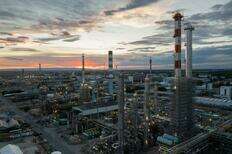- MOL completed its first ISCC PLUS-certified production run using circular feedstock in Tiszaújváros.
- The process converts post-consumer plastic waste into polyethylene and polypropylene.
- MOL aims to use up to 1.5 million tonnes of feedstock for the energy industry by 2030.
- The mass balance approach was applied to track circular material in the process.

Introduction
MOL Group has completed its first ISCC PLUS-certified production run using circular feedstock at its Petrochemicals site in Tiszaújváros, Hungary. This marks a significant step in integrating circular economy practices into its operations.
Process and Certification
The pilot test involved converting post-consumer plastic waste into high-quality polyethylene (PE) and polypropylene (PP). The process utilized a mass balance approach to track and account for circular material when processed with traditional inputs. This achievement follows the ISCC PLUS certification obtained by MOL Petrochemicals in Tiszaújváros and Slovnaft in Bratislava in 2024 for steam cracker and polymerization units.
Strategic Goals
MOL aims to transform its operations towards circular chemicals, with a target to utilize up to 1.5 million tonnes of feedstock for the energy industry by 2030. This strategy is supported by a growing portfolio, including a concession to manage municipal waste in Hungary and past acquisitions in plastics recycling.
Future Plans
MOL Group plans to continue testing additional circular feedstocks and developing new processes to expand the role of waste as a raw material for plastics production. The company is committed to advancing chemical recycling technologies through partnerships and maximizing synergies with waste management.

